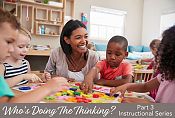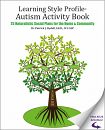Sale thru 4/30/25
How To Create Joint Action Routines For Children With Autism: Strategies To Facilitate Vocabulary, Phrases, And Social Use Of Language – LSP Part III Instructional Series #e253
Presenter: Patrick Rydell, Ed.D., CCC-SLP
Learn step-by-step strategies to design and implement Joint Action Routines to facilitate verbal communication.
This course is part of the Learning Style Profile© Training Series. The below 2 courses are suggested prerequisites prior to taking this course.
– G.B., prior course participant
Read more comments about this course!
This course provides SLPs with step-by-step strategies to design and implement Joint Action Routines (JARs) as a preferred tool to facilitate verbal communication in children with autism. JARs are best practice, naturalistic, social-communicative routines that occur among adult or peer partners and the child with autism that provide rich contexts for language learning, including vocabulary, generative language and social use of language. Dr. Rydell fully describes each component of a JAR, including:
- A common, unifying theme or purpose.
- Themes are based on the child’s intrinsic motivation and interest.
- Actions are sequenced into logical plan of action.
- Multiple opportunities for learning and practicing.
- Systematic variation and novelty are built into each subsequent routine.
- Roles and responsibilities are exchanged.
- Interactions prioritize social orientation, awareness and joint attention.
- Interactions support a social priority and people-oriented learning style.
- Interactions support partners as important sources of new information.
- Interactions support contingent actions, social reciprocity, follow through, and social imitation supports language learning and development.
Offered for 0.1 ASHA CEUs – 1 Contact Hour.
Course Overview – Run Time: 1:13:55
- Description of the Learning Style Profile© (LSP) for Children with ASD.
- Description of Joint Action Routine components.
- JAR-based vocabulary development.
- JAR-based generative language development.
- JAR-based social-pragmatic development.
- Incorporation of peer mentors into JARs.
– J.B., prior course participant
Read more comments about this course!
This presentation will focus exclusively on the Learning Style Profile© (LSP). Other treatment approaches will receive limited or no coverage as part of this training. Presenter financial and non-financial disclosures may be found in the Presenter & Disclosures area.
Video PowerPoint presentation with author narration & downloadable handout. Stop and re-start the course at any point. Learners retain access to course content after completion for ongoing reference and review.
Reviews
"The use of JARs to decrease direct instruction and increase self-led learning by "looking up" and "looking around" to peers was most beneficial to my clients. The presenter was very engaging and had concise, well-written power points to review over time." S.O. (Mar. 2025)
"How peers can interact and help 'teach' the child with ASD was beneficial. I enjoyed the examples given." K.M. (Feb. 2025)
"I really enjoyed this course and will definitely be reviewing the 10 components needed to create and maintain a JAR. It was fast, informative, and the presenter seemed passionate about the material." K.R. (Feb. 2025)
"It was beneficial to discuss using nonverbal strategies first and to include peers as early as possible." A.K. (Jan. 2025)
"Using peers for engaging was a helpful topic. I enjoyed the clear slides." E.S. (Jan. 2025)
"I appreciated his emphasis on varying the teaching so that the child has to keep developing variations on their speech, not becoming robotic in their responses. I think we tend to use the same carrier phrases over and over to develop skills instead of generative language. Speaker is very specific and supports each statement with specific requirements." L.S. (Dec. 2024)
"The rationale provided for the implementation of non-verbal JARs prior to verbal JARs was very helpful." S.G. (Dec. 2024)
"The value of peers as mentors, and the need for children with ASD to seek out, orient to and learn actively from peers as role models was a beneficial topic. I liked all of the information." L.C. (Sep. 2024)
"Limiting directives and instead focusing on orienting to peers was a beneficial topic. I also love starting with nonverbal routines, then overlaying language (verbal mapping). This course had a large amount of information. Very clear. Will refer back to handout for specific wording." K.C. (Sep. 2024)
"Peer Modeling was beneficial. Loved the explanation by speaker on powerpoint slides." L.H. (Aug. 2024)
"Using peers to develop social communication during routines was a beneficial topic. The course was easy to follow." J.W. (Aug. 2024)
"Incorporating peers in JARs from the beginning was beneficial to discuss. The course was very thorough and well-organized." M.J. (Jul. 2024)
"I liked how the presenter suggested including peers in the joint action routines right from the beginning. This helps with generalization. Also, I liked how he teaches children with autism to look up, look around, you have value. I'm glad he included an example of a joint action routine." A.C. (Jul. 2024)
"Great ideas for how to model and have peers model social language and turn-taking. I liked that this course pertains to my daily work." M.R. (Jun. 2024)
"The examples were beneficial and the course was very clear." L.G. (Jun. 2024)
"Building in coached, structured, yet free-flowing play. Great uses of examples in a real, planned play routine." S.K. (Jun. 2024)
"Discussing the flexibility of who takes the lead and orienting a child with autism to learn variation from the variety of language to create flexibility as well as learning from peers as a source of how to engage in conversation. I liked that the interactions are contingent upon one another and being aware of what is going on around them. Clear teaching and order of how to build JARs." S.B. (May. 2024)
"Beneficial discussion on autism. I liked the practical examples." R.I. (May. 2024)
"Discussing how to maximize JARs was helpful. Great examples." A.S. (Apr. 2024)
"I like the review of JARS. Information is organized and makes sense." S.S. (Mar. 2024)
"Specific topics that were most beneficial were Joint Attention Routines, Coach Rotation, and Peers Model Words, Phrases, and Social Use of Language. What I like best and appreciate the most about this course are the strategies provided and Dr. Rydell's presentation style." L.A. (Feb. 2024)
"Discussing JARs was beneficial. The content was explained very thoroughly." C.C. (Feb. 2024)
"The use of peer mentors was helpful. I enjoyed the part of having the child with ASD think so that he/she can lay down and practice speech/social pathways." S.A. (Jan. 2024)
"All of the course was beneficial. I enjoyed everything. It was such good information." S.M. (Dec. 2023)
"Organized and clear presentation. Strategies to facilitate functional communication in more functional social interactions as well as provide the basis for future verbal communication development." J.H. (Dec. 2023)
"I liked the ease of adaptability of JARs into therapy sessions. The specific examples of target vocabulary in 2-word utterances with the use of JARs were beneficial." J.D. (Dec. 2023)
"The description of joint action routines was helpful." K.R. (Dec. 2023)
"Simple example of how to implement. I enjoyed the use of several semantic components vs one. Good reminder re: pivot grammar." D.A. (Nov. 2023)
"The entire topic was beneficial. I enjoyed the content and presentation." R.S. (Nov. 2023)
"The concept of completely relying on a non-verbal peer model during the initial presentation of a joint action routine is interesting. Also, I am interested in attempting to change roles and allow the target child to take the lead in the activity. I liked that the instructor provided a specific example." A.L. (Nov. 2023)
"This course was full of information. I liked the coach rotation information and implementing peers." L.G. (Oct. 2023)
"I liked the review of how to best incorporate joint action routines and the use of peers to help in the process." S.S. (Oct. 2023)
"The use of peers in order to generalize language and social skills was helpful. This is a different approach, specifically structuring variations and choices within the activity to expand language." D.R. (Oct. 2023)
"Learning how to contrive turn-taking opportunities with peers where the coach trades off. I really appreciated the example provided with the crashing/splashing cars and trucks." L.S. (Oct. 2023)
"The goal of teaching language and how to achieve it using JARs was beneficial. This information was very helpful to me, as I work in a private clinic where more than half my patients have ASD, ADHD, or social anxiety." V.H. (Oct. 2023)
"Very clear presentation. I liked using peers as mentors." T.R. (Oct. 2023)
"JARS are an excellent way to teach children with autism how to improve their social language abilities. I liked the specific examples, truck/ramp routine." M.P. (Aug. 2023)
"I liked learning about JAR. I've used this system for years with students with ASD and it's nice to have a label to put with the practice." S.E. (Aug. 2023)
"Learning how to use peers effectively. The presenter was very knowledgeable and gave great analogies to help me understand." R.R. (Jul. 2023)
"Pivot Grammar in JARs was a beneficial topic. I liked the multiple explanations of materials to help with long-term knowledge." T.E. (Jun. 2023)
"Concept of peer mentoring in a naturalistic, child-led role was beneficial. I liked Dr. Rydell's presentation style." M.A. (May. 2023)
"This approach adjusts to the specific needs of the child with autism. Provides tools for SLPs working with ABA team." R.M. (Apr. 2023)
"Language mapping was beneficial. I liked the characteristics of good joint action routines." L.R. (Apr. 2023)
"I liked the coach rotation, creating joint attention routines, using pivot grammar. Themes are based on the child’s intrinsic motivation and interest. Actions are sequenced into logical plan of action. Multiple opportunities for learning and practicing." M.M. (Apr. 2023)
"Going into detail to define JAR was beneficial. I liked the goals presented and course clearly laid out things to think about when implementing JARS." K.W. (Apr. 2023)
"The presenter provided examples of how to incorporate joint action routines into activities. The presenter was very knowledgeable about the components of joint action routines and how to incorporate those components into an activity." M.H. (Feb. 2023)
"Learning how JARs could be used to facilitate communication with children with ASD. As a behavior clinician, I see my role as so vital in a child's learning. The speaker explained in depth, and his use of scenarios was amazing." A.O. (Jan. 2023)
"The information on JARs will be very helpful for the classroom-based setting I work in. The speaker was clear and easy to follow. The information was also easy to follow and take notes." S.S. (Jan. 2023)
"Easy to follow and practical application tips. Information on expanding and developing language and relationships with peers was beneficial." S.E. (Jan. 2023)
"I liked the use of JARs and the value of play with peers. And the theoretical base which is "sound" (grounded) and from highly respected researchers." S.E. (Dec. 2022)
"I liked the idea of starting with non-verbal play routines. I feel sometimes as SLPs we constantly control the situations and we use too much language. I liked the suggestions of the non-verbal JARs, and also using the five semantic categories as a means of establishing and expanding on social routines." M.L. (Dec. 2022)
"Using actions with peer involvement for student's language development was beneficial. I liked that course emphasized peer involvement in therapy." L.W. (Dec. 2022)
"I liked how presenter outlined what to do and how to include peers. Also how to begin with a non-verbal activity and build language on top of it." J.S. (Dec. 2022)
"I will glean ways in which to teach and interact with joint action routines in a more specific way demonstrated in this course." K.K. (Dec. 2022)
"I liked the peers model and helping children notice/learn from their peers. I also liked the concrete examples." C.W. (Dec. 2022)
"The concept of JAR and the benefits for life-long learning were helpful. I liked the idea of teaching children with autism how to find value in learning from their peers." K.J. (Dec. 2022)
"I liked that course was delivered in a simple and precise format." S.B. (Dec. 2022)
"I liked that the notes were available to print and the presenter was easy to understand." V.G. (Dec. 2022)
"We are beginning to implement Jars in our school so the entire presentation was informative. What was particularly interesting was the use of peer mentors and the rational behind that. Very practical to daily practice." J.M. (Nov. 2022)
"In our ETS program we facilitate several joint action routines in which we target expressive, receptive language, imitation, play and social skills. The examples provided here were helpful for this." R.K. (Nov. 2022)
"I enjoyed all aspects of this course. Dr. Rydell is an amazing presenter. I found the discussion surrounding the verbal and non-verbal Jars valuable. The use of non-verbal JARs will help me to lay the foundation for language development with my newer learners in our class." G.B. (Nov. 2022)
"The JARs example was a great way to explain how this can be implemented with students. I genuinely liked the entirety of the course and all of the information provided. I liked that he went into detail about the steps needed to facilitate the JAR approach and other approaches used to increase understanding, engagement and carryover." C.P. (Nov. 2022)
"I liked the depth and examples - the breakdown of what is part of an effective JARS routine." C.J. (Nov. 2022)
"Clear presentation." A.W. (Nov. 2022)
"I liked the organization of material and direct instruction of implementation." S.F. (Oct. 2022)
"The basic idea that you establish the non-verbal JAR and overlay the verbal component was great! The course was well organized." B.D. (Sept. 2022)
"The discussion of using semantic comparisons to build vocabulary and generative language was helpful." A.G. (Aug. 2022)
"I enjoyed the practical ways to bring peers into JARs. This course was engaging and informative." D.A. (Aug. 2022)
"I enjoyed the discussion about the benefits of peer modeling vs adult modeling in language/social learning. This course was easy to understand and was very interesting with many good concepts that are easy to apply to daily therapy sessions." R.P. (June 2022)
"Clear examples. I liked the examples of what to say and how to use the peer." C.W. (June 2022)
"I liked the tips on vocabulary to use during JARS. The course was easy to follow along." H.E. (June 2022)
"I especially appreciated the discussion point pertaining to JAR based vocabulary. The vital importance of expanding sematic category goals for children with ASD was emphasized. The course provided valuable insight and guidance towards the development of JARs." A.M. (May 2022)
"The course was practical." K.R. (May 2022)
"It was easy to understand and follow." A.B. (May 2022)
"Post pandemic, it has been difficult for speech providers to receive training in JARs. This course is worth taking to give insight into how to create, implement, and evaluate JARs. It went step-by-step over how to create an effective JAR." M.L. (May 2022)
"The break-down of peer involvement in Joint Action Routines was very informative and thorough. The overview and explanation of the foundation and implementation of Joint Action Routines in relation to the Learning Style Profile strategy was good." A.C. (May 2022)
"I enjoyed learning about the selection of vocabulary to implement when completing a verbal JAR series." K.D. (Feb. 2022)
"It was well-organized and easy to follow." K.K. (Feb. 2022)
"I appreciated how Dr. Rydell discussed everything from the Learning Style Profile to Peer Modeling of words, phrases, and the social use of language. I enjoyed the way he talked about going from basic nonverbal communication teaching to coaching, using peers, and/or the child with ASD so that the child can achieve an ability to socially interact with others." E.H. (Feb. 2022)
"The presenter was very clear and gave good examples. I liked the variation of different play schemes (and the corresponding language)." B.F. (Jan. 2022)
"I liked the handouts, and examples of how to implement the LSP. Enjoyed the speaker's way of presenting information, easy to understand with clear objectives." J.S (Jan. 2022)
"The course was a nice review of joint play strategies. I liked the illustration of inclusion of peers." A.R (Jan. 2022)
Course Objectives
- Describe the components of Joint Action Routines (JARs).
- Describe how each JAR component helps to facilitate communication development.
- Describe the role of peer mentors as a critical component within the JARs.
Presenter & Disclosures

Patrick J. Rydell, Ed.D., CCC-SLP, is the Founder and Director of the Rocky Mountain Autism Center, Inc. and Autism On Call, LLC, in Lone Tree, Colorado. With more than 38 years of practice (“on the floor”) in the field of Autism Spectrum Disorder (ASD), he has provided international and national trainings, workshops, consultations and program development to governmental agencies, medical facilities, universities, school districts, professionals and families. His doctorate was earned through a National Institute of Health Leadership in Autism grant (1989) and he has a double master’s degree in speech pathology and special education with a program emphasis in early childhood and autism spectrum disorder. Dr. Rydell is a U.S. Fulbright Senior Specialist Grant recipient (2005). Dr. Rydell is the co-author of the SCERTS Model (Prizant, Wetherby, Rubin, Laurent & Rydell, 2006) and author of the Learning Style Profile for Children with Autism Spectrum Disorder (Rydell, 2012) and Autism On Call Educational Series (Vimeo, 2017). Dr. Rydell has also co-authored 5 book chapters and numerous peer-reviewed research articles on topics related to autism spectrum disorders. He is currently developing ASD programs across Asia, Central Asia, and South America based on the LSP approach.
Speaker Disclosures:
Financial — Patrick Rydell is a presenter of online CE courses sponsored by Northern Speech Services; receives royalty payments.
Financial — Patrick Rydell is the author of Learning Style Profile Autism Activity Book; receives royalty payments.
Financial — Patrick Rydell is the author of Learning Style Profile for Children with Autism Spectrum Disorder, published by Rocky Mountain Autism Center (January 21, 2013); receives royalty payments.
Nonfinancial — Patrick Rydell has no relevant nonfinancial relationships to disclosure.
Intended Audience / Accreditation

This program is offered for 0.1 ASHA CEUs (Intermediate Level; Professional Area).

Intended Audience
- Speech-Language Pathologists
ASHA CEUs:
Northern Speech online courses are registered with ASHA and are offered for ASHA CEUs. The number of ASHA CEUs is noted above. Note that 0.1 ASHA CEU = 1 contact hour = equals 1 CEE.
Earning ASHA CEUs and the ASHA CE Registry:
To earn CEUs from this course and have ASHA CEUs submitted to the ASHA CE Registry, course participants must satisfy each of these requirements:
- Participants must meet the eligibility requirements to earn ASHA CEUs (see below).
- Participants must indicate – prior to course completion – their intent for Northern Speech to submit this course to ASHA.
- Participants must complete/view this course in its entirety.
- Participants must complete the course post test with a minimum of 80% accuracy.
- After successful completion of the post test and completion of the course evaluation, a certificate of course completion is presented to the participant electronically via PDF.
- For those participants who indicated their intent for the ASHA CE Registry, course completion status will be submitted by Northern Speech to ASHA within 45 days of the course completion date.
Eligibility To Earn ASHA CEUs:
Attendees must meet at least one of the following conditions in order to be eligible to earn ASHA CEUs:
- Current ASHA Member.
- ASHA Certificate of Clinical Competence (CCC) Holder.
- Licensed by a state or provincial regulatory agency to practice speech-language pathology (SLP) or audiology.
- Credentialed by a state regulatory agency to practice SLP or audiology.
- Credentialed by a national regulatory agency to practice SLP or audiology.
- Engaged in a Clinical Fellowship under the supervision of an individual with their ASHA CCC.
- Currently enrolled in a master's or doctoral program in SLP or audiology.
If an attendee is not an ASHA member or CCC holder but meets any of the above criteria, they may inform the ASHA CE Registry of their eligibility by visiting this site.
ASHA CE Registry:
During the enrollment process, if you select to receive ASHA credit for this course and if you provide your ASHA number, Northern Speech will automatically submit your CEU information to the ASHA CE Registry after successful course completion (80% on post test). This submission happens once per month, during the first week of the month. For example, if you complete your course on November 7th, Northern Speech will submit all November online course CEUs to ASHA during the first week of December. When ASHA inputs the information into their database, they will mark the course as completed on the last day of the month in which it was completed, so November 30th using this example. The certificate of completion available for you to print immediately, however, will reflect the actual completion date, November 7th in this example. Due to ASHA processing procedures please allow 2-3 weeks, from the submission date, for the course to appear on your ASHA transcript.
Licensing Boards: Most state licensing boards DO accept CEUs earned online (usually classified as home-study credits). Some state boards do, however, place a limit to the number of credits that can be earned via home study/online courses. For the most current information, we suggest that you contact your licensing board or agency to verify acceptance policies and/or any credit limits related to home-study courses prior to registering for this course.
Additional accrediting agencies by which Northern Speech is an approved CE provider:
- California: NSS is approved as a provider of continuing education by the California Speech-Language Pathology & Audiology Board. Provider #PDP4. Online CEU limits may apply; please contact SLPAHADB for current online CEU acceptance policies.
- Iowa: NSS is approved as a provider of continuing education by the Iowa Board of Speech Pathology and Audiology Examiners. Provider #169.
- Kansas: NSS is approved as a provider of continuing education by the Kansas Department of Health and Environment. Provider #LTS-S0005.
- Florida: NSS is approved as a provider of continuing education by the Florida Speech-Language Pathology and Audiology Board. Provider #SPA-026.
- New Jersey: NSS is approved as a provider of continuing education by the New Jersey Department of Education. Provider #1654.
Frequently Asked Questions
Customer Support: Please phone 888.337.3866 or email info@northernspeech.com.
Course Completion Timeframe:
You have unlimited time to complete our online courses. You may log off and log on as often as you’d like to in order to complete all sections of a course.
However, completion dates are based on Eastern Standard Time. Therefore, if you need your CEUs by a certain date, be sure to complete the course test before 11:59pm EST on that date. For example, if you need CEUs before January 1st, you will need to complete the course test before 11:59pm EST on December 31st.
Content Access:
Access to course materials and content does not expire, even after completing the post test. You may continue to review course material by logging into your NSS account, clicking the My Online Courses tab, and then viewing your desired course.
Certificate of Completion:
On successful completion of the post test (80%), a certificate will be immediately available for download and/or printing. This certificate will include your name, date of completion (based on Eastern Time Zone, USA/Canada), and number of contact hours (CEUs / CEEs). Please note that CEUs are awarded on the date of successful test completion, not the date of course enrollment. Please ensure that you successfully complete the post test prior to any licensure renewal dates.
ASHA CE Registry Submission:
During the enrollment process, if you select to receive ASHA credit for this course and if you provide your ASHA number, NSS will automatically submit your CEU information to the ASHA CE Registry after successful course completion (80% on post test). This submission happens once per month, during the first week of the month. For example, if you complete your course on November 7th, NSS will submit all November online course CEUs to ASHA during the first week of December. When ASHA inputs the information into their database, they will mark the course as completed on the last day of the month in which it was completed, so November 30th using this example. The certificate of completion available for you to print immediately, however, will reflect the actual completion date, November 7th in this example. Due to ASHA processing procedures please allow 2-3 weeks, from the submission date, for the course to appear on your ASHA transcript.
Purchase Orders:
Purchase orders are currently not accepted for online orders, if you wish to submit a purchase order please do so at info@northernspeech.com or fax to 888-696-9655.
What is an Online Course?
Our Online Courses consist of video, audio, and/or text content and are offered for ASHA CEUs. Unlike a webinar, which requires participants to be logged on and at a computer at specific times, our Online Courses are available to you at any time, from any device, via your NorthernSpeech.com online account. You may work at your own pace and start and stop your course as you wish. Your course will conclude with a short post test. On successful completion of the post test (>80%), a printable certificate of completion is presented to you.
Receiving CEUs:
Northern Speech is an ASHA CE Provider and our online courses are registered with ASHA and offered for ASHA CEUs. Please note that successful completion of the online post test is required prior to the awarding of CEUs. Please contact your state licensing board for acceptance policies related to CEUs earned online. Please note that courses offered for university students are not applicable for CEUs.
Registering for an online course:
You may browse all online courses by clicking the Continuing Education tab above, then Online Courses. Once you find a course, click Enroll Now, and you will be asked to either log into your existing Northern Speech account or create a new online account. Once you’ve entered your account information and provided your credit card payment, your course will be immediately available to you.
Accessing your purchased course or returning to a purchased course:
You will be able to access your online course by logging into your Northern Speech account and then clicking the My Online Courses tab on your profile screen. Click the course you would like to start or to resume. From there, proceed through the course sections until you are ready to complete the post test. You do not have to complete your course all at once. You may log on and off as you wish.
Testing requirements:
Each online course concludes with a post test consisting of multiple choice or true & false questions. Scores of 80% or greater are required for successful course completion and awarding of CEUs. You may revisit course materials and retest as needed to achieve a passing score.
Number of CEUs offered:
We offer courses from 1 to 21 contact hours. Each course will note the number of CEUs offered. Please note that 0.1 CEU = 1 contact hour = 1 CEE.
State licensing boards and online CEUs:
NSS is an ASHA CE Provider and most state licensing boards DO accept ASHA CEUs earned online (usually classified as home-study credits). Some boards do, however, place a limit to the number of CEUs that can be earned via home study/online courses. For the most current information, we suggest that you contact your licensing board or agency to verify acceptance policies and/or any CEU limits related to home-study courses prior to enrolling in an online course.
Course formats:
Our course formats include: text, audio, video, and PowerPoint with author narration. Each course will note the format on the course description page. Most courses include closed captioning.
Course handouts:
Most of our online courses provide a link to download the accompanying handout as a PDF file.
Group discounts:
Groups of 3 or more are eligible for a 20% discount on each registration on most of our online courses. To receive this discount, registrations need to be processed together via the "Group Rates" tab on the Online Course of your choice.
Computer requirements:
For our online courses to function best, we recommend that you update your computer to include the newest version of your Internet browser (Safari, Chrome, Firefox, Edge, Internet Explorer, etc.) and newest version of your computer's operating system. Also a high-speed Internet connection is recommended (cable or DSL). Speakers or headphones will be required for many of our courses as many contain audio components.
Course Cancellation Policy:
A purchased online course can be exchanged, refunded, or transferred to another individual if contact is made with NSS (via phone or email) within 30 days of purchase and the course materials have not been viewed or downloaded.
Special Needs:
Please click here for any special needs requests, and we will do our best to accommodate them.
| Contact Us |









